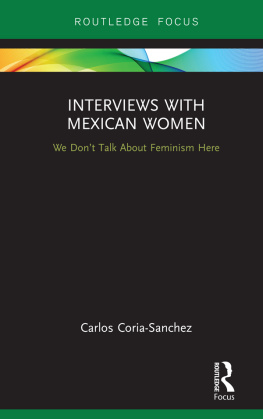Interviews with Mexican Women
Interviews with Mexican Women: We Dont Talk About Feminism Here presents a series of conversations with Mexican women representing a wide geographical range within Mexico. The interviews broach current social issues and discuss their correlation to the Mexican feminist movement of the 1970s and 1980s. This unique project focuses on cultural, political, economic, and social topics as they pertain to Mexican women impacted (or not) by the womens struggle in Mexico to achieve gender equality in their country.
This book offers a rare insight into feminist influence on many areas of social life, and will be a vital text for students and researchers in Gender Studies and Mexican or Latin American Studies.
Carlos M. Coria-Sanchez is an Associate Professor at the University of North Carolina Charlotte in the Languages and Culture Studies Department and in the Latin American Studies Program of which he is Director. He teaches courses in Mexican and Latin American Literature, Latin American Women Writers, and Mexican Women Writers. Dr. Coria-Sanchez has coedited two books published by Yale University Press: Visiones: Realidades sociales en la literatura Hispana, Fall 2002; and Temas del comercio y la economa en la narrativa hispana, Spring 2008. In 2010 McGraw-Hill published his coauthored text book, Entre Socios: Espaol para el mundo profesional. Also, in 2010, Plaza y Valdez published his book Angeles Mastretta y el feminismo en Mxico. In 2016 McFarland & Co. published his coauthored book Mexican Business Culture: Essays on Tradition, Ethics, Entrepreneurship and Commerce and the State. More recently, in 2018, Ediciones Eon published his book Mexicanos al grito de Viva Estados Unidos. Dr. Coria-Sanchez was the recipient of the Fulbright Scholar Grant in 20082009.
Focus on Global Gender and Sexuality
Trans Dilemmas
Stephen Kerry
Gender, Sport and the Role of the Alter Ego in Roller Derby
Colleen E. Arendt
The Poetry of Arab Women from the Pre-Islamic Age to Andalusia
Wessam Elmeligi
Interviews with Mexican Women
We Dont Talk About Feminism Here
Carlos M. Coria-Sanchez
www.routledge.com/Focus-on-Global-Gender-and-Sexuality/book-series/FGGS
First published 2019
by Routledge
2 Park Square, Milton Park, Abingdon, Oxon OX14 4RN
and by Routledge
52 Vanderbilt Avenue, New York, NY 10017
Routledge is an imprint of the Taylor & Francis Group, an informa business
2019 Carlos M. Coria-Sanchez
The right of Carlos M. Coria-Sanchez to be identified as author of this work has been asserted by him in accordance with sections 77 and 78 of the Copyright, Designs and Patents Act 1988.
All rights reserved. No part of this book may be reprinted or reproduced or utilised in any form or by any electronic, mechanical, or other means, now known or hereafter invented, including photocopying and recording, or in any information storage or retrieval system, without permission in writing from the publishers.
Trademark notice: Product or corporate names may be trademarks or registered trademarks, and are used only for identification and explanation without intent to infringe.
British Library Cataloguing-in-Publication Data
A catalogue record for this book is available from the British Library
Library of Congress Cataloging-in-Publication Data
A catalog record for this book has been requested
ISBN: 978-1-138-58137-1 (hbk)
ISBN: 978-0-429-50545-4 (ebk)
Typeset in Times New Roman
by Apex CoVantage, LLC
The 1970s and the subsequent decades were of enormous importance to the feminist activist movement in Mexico. It is likely that many upper-middle- to upper-class women may have been influenced by the writings and engagement of women and men involved with the movement during this time. However, it is difficult to trace a visible impact that the feminist ideologies of these years had on middle- to lower-class women. It is possible that these women did not have direct access to the literature associated with the feminist movement or the undertakings that an important portion of the population was carrying out to promote womens rights in many areas of social life namely, politics, economy, arts, culture, and business in a nation with a long history of patriarchal dominance.
The interviewees have been chosen arbitrarily through contacts in Mexico. These women belong to different social levels and education; they are in their twenties, thirties, forties, fifties, sixties, or seventies. They are either employed, retired, or housewives, and the interviews include two population types: 1) Mexican women who were young during the fervent years of feminist activity with an analysis of how it affected their lives up to current times, and 2) Mexican women who didnt live through those tumultuous years but whose way of life and thinking have been the final product of the history of the feminist movement. There is not a questionnaire per se . Instead, an outline of topics is used to create a narrative; the goal is to generate a structured dialogue in which each interviewee feels free to talk about social issues as they pertain to their own firsthand experiences in Mexico during the feminist movement and thereafter. It is important to note that most of the interviews were conducted in Spanish and translated into English; however, once aware that this was a book to be published in English, some of the interviewees decided to speak in this language instead of having their narratives translated. Accordingly, minor editing has been done to these interviews.
I would like to express my gratitude to the following people for their help with some of the interviews: Olivia Daniela Garcia, John Hyatt, and Nash-aly Ruiz-Gonzalez. Also, as always, my gratitude to my wife Karyn for her support throughout the process of writing this book, for reading it and for her insightful suggestions and comments. A special thank you to all those brave Mexican women who generously shared their stories with me for this project they are the real authors. I love my sons Alberto, Pablo, and Oliver. I couldnt have a better family.
1
Introduction
Before talking about Mexican womens rights, it is important to remember that the 1970s was a decade of a strong womens civil liberties movement in Mexico that influenced other neighboring countries as well. The Mexican feminist movement of this era hosted the first International Womens Conference in Mexico City in 1975 that attracted women and organizations from all over the world. This symposium was one of many social events that illustrate the great significance of the feminist movement in the nation.
The 1970s was a time of multiple social struggles for economic, political, cultural, and educational rights for women throughout Mexico. During this decade and the ones that followed, a myriad of women wrote and openly denounced oppressive social conditions via what would come to be considered the most important and oldest feminist magazine in the country and in Latin America: FEM . Women wrote about issues such as school education, sex education, marriage, housework, art, culture, and society in general in a country with a long history of patriarchal non-written rules that disadvantaged women. At first FEM was perceived as an elitist journal for those who belonged to the academic community and for the upper-middle to upper classes since it was hardly read by middle- and working-class women. However, the journal was one more contributing element in the complex set of dynamics that raised consciousness in millions of women about their subordinate status under a male-ruled Mexican society. These years also saw the rise of important Mexican female writers like Angeles Mastretta, Ethel Krauze, Laura Esquivel, and Brianda Domecq, among others, who clearly identified themselves with the feminist movement in the country, and who tried to influence their readers through their works: novels, short stories, plays, essays, and poetry.









